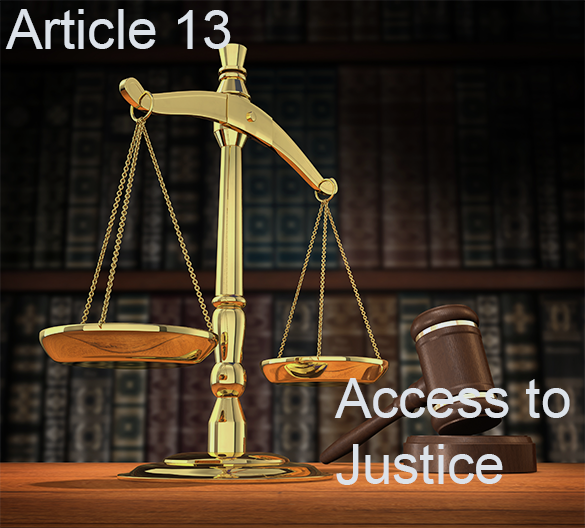There are a number of changes in the civil justice system in the UK through the introduction of the Legal Aid Sentencing and Offenders Act 2012, which mean that legal aid is either no longer available or is far harder to access for disabled people in a range of important areas of law, jeopardising disabled people’s ‘effective access to justice’.[1] The changes in law to legal aid and judicial review described below are likely to have a disproportionate impact on disabled people because disabled people are more likely to use public services and receive welfare benefits than non-disabled people.[2] The Ministry of Justice conducted an equality impact assessment which concluded “that overall the proposals have the potential to impact a greater proportion of women, BAME people and ill or disabled people.” [3] The assessment found that, whilst 19% of the general population have a long-term illness or are disabled, the figure was 58% of those receiving legal aid for welfare benefit claims. This figure is consistent with academic research which suggests that whilst 3.2% of the general population have welfare benefit problems, the figure is 7.2% for those with a long-term illness or disability. Further, those with long-term illness or disability are more likely to suffer multiple problems.[4]
To get legal aid for a discrimination case, disabled people must use a telephone gateway, and there are now only three firms allowed to apply for legal aid for discrimination claims. This has resulted in a massive drop in the number of people getting legal aid for this type of case; in terms of discrimination cases there is a 77% shortfall in the predicted take-up since these restrictions were introduced[5]. This means that only very small numbers of disabled people are accessing legal aid for discrimination claims in the fields of employment, and goods and services.
Changes to the way judicial review is funded (implemented as of 22 April 2014) are likely to have a severe impact on disabled people’s ability to challenge public bodies. This is particularly relevant regarding community care cases, usually those where a local authority has failed to assess the needs of, or failed to provide care services for, a disabled person. It is frequently the case that the council will not settle the claim before the court case begins, but then settles shortly after proceedings start. If this happens, there is now no guarantee that the lawyers will be paid for the work they have done in taking the case to court. The Legal Aid Agency (LAA) will exercise its discretion in deciding whether to pay or not, if the case is one where permission (a preliminary stage in a judicial review claim) has not yet been granted. If a case has become academic, because the council has done what you asked, the court will generally not grant permission; the court is also often unwilling to order the council to pay the costs of the person bringing the claim, so the costs can only be met out of the Legal Aid Fund. But the LAA can now refuse to pay if they think that you should not have started the court case. Lawyers are therefore now expected to do significant amounts of work for disabled people and risk not getting paid. This is likely to have the knock-on effect of fewer cases of this type being brought, and/or lawyers only taking the cases that are bound to win, and refusing to take on more complicated or risky challenges.
The financial eligibility rules for legal aid have been changed. Prior to April 2012, anyone on a means-tested benefit would be financially eligible for legal aid, regardless of their level of savings or how much equity they have in their property. Now, there is a cap on the amount of capital someone can have, even if they are on a means-tested benefit. This means that a disabled person who for example is on income support or income-related Employment and Support Allowance, but has more than £8,000 in savings is no longer eligible for legal aid[6], and those with savings over £3,000 have to make a significant contribution to their legal costs from their capital.
The introduction of tribunal fees for disability discrimination cases of £1,200 (2013) has led to a drop of 58 per cent in disability discrimination claims (October-December 2013). The fee remissions scheme benefits only the very poorest. In consequence disabled workers are being hindered in seeking justice.
Concerns were raised in a report published in 2010 as to whether young offenders with learning difficulties and other impairments were receiving a fair trial, as a result of their difficulties in understanding the legal and judicial process.[7] Despite many calls for improvement, a 2014 report found the needs of many people with learning disabilities are going unnoticed when they are arrested by police, go to court and are sentenced.[8]
[1] http://www.un.org/disabilities/default.asp?id=273
[2] Disabled people are twice as likely as non-disabled people to be social housing tenants: http://www.papworth.org.uk/downloads/disabilityfactsandfigures2010_100202152740.pdf
Disabled people are more than twice as likely (66.7%) as non-disabled people (33.1%) to be receiving state benefits or tax credits : Annual population survey 2009
Disabled people are more dependent on public transport because 60% of disabled people have no car available to the household, compared to 27% of the overall population: http://www.papworth.org.uk/downloads/disabilityfactsandfigures2010_100202152740.pdf
The majority adults receiving care and support are state funded (1106000 adults receive state funded care compared to 450000 self-funders): http://consultations.dh.gov.uk/social-care-funding/funding_reform/consult_view
[3] Reform of Legal Aid in England and Wales: Equality Impact Assessment (EIA) June 2011
http://webarchive.nationalarchives.gov.uk/20111121205348/ http:/www.justice.gov.uk/downloads/consultations/legal-aid-reform-eia.pdf, See Table 6, in particular
[4] English and Welsh Civil and Social Justice Panel Survey: Wave 1, published in 2011 http://www.justice.gov.uk/downloads/publications/research-and-analysis/lsrc/2011/civil-justice-wave1-report.pdf
[5] See “Civil legal aid – the secret legal service”, a report published by Legal Action Group in September 2013 reviewing the figures for legal aid take-up in the first quarter of 2013-14.
[6] The evidential requirements have also become much stricter and many disabled people struggle to provide the necessary documents: three months of original bank statements up to the precise date of the legal aid application, a recent letter confirming receipt of benefits, details of any transactions over £150 appearing on any bank statement (whether withdrawal or deposit); the LAA often requests more than this with no specific authority or justification for doing so, delaying access to justice.
[7] Prison Reform Trust, Seen and Heard: supporting vulnerable children in the youth justice system (2010) www.prisonreformtrust.org.uk/uploads/documents/SeenandHeardFINAL.pdf
[8] http://www.hmic.gov.uk/news/news-feed/offenders-with-learning-disabilities/




